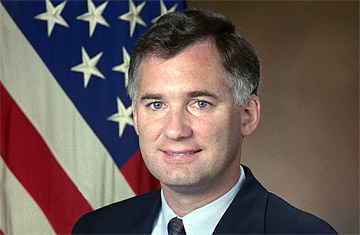
William Lynn
Last year the Pentagon paid the Raytheon Corp., its fifth largest contractor, a cool $10 billion for its missiles, missile shields and a constellation of electronics. This year President Barack Obama is putting Raytheon's recently departed top lobbyist in charge of the Pentagon's day-to-day management.
In Washington that almost qualifies as business as usual, except for a small detail: on the campaign trail, Obama vowed to stop the revolving door that lets onetime lobbyists go to work for the Federal Government and oversee contracts that could harm — or help — their former employer. And one of the first things the new President did in office was seemingly make good on that promise, signing an Executive Order barring former lobbyists from joining his Administration to work at agencies they recently lobbied. (See pictures of Obama's Inauguration.)
Not surprisingly, Obama's good-government backers were less than pleased to see the President, only a few days after signing the blanket ban, issue a waiver permitting William Lynn to serve as Deputy Secretary of Defense. The lobbying loophole was allowed, Administration officials explain, because Lynn is "uniquely qualified" for the job. Realists at the Pentagon and elsewhere put it slightly differently, saying the President was simply acknowledging that people who know how to run the Pentagon generally have been involved in the process.
The episode is a painful lesson for Obama. Even though his team asserts that it has put into place the toughest rules ever against lobbyists going to work for the Federal Government, the only thing most folks will remember is that Obama made an exception to that rule for one of his top officials. (See who's who in Obama's White House.)
As with most Federal Government arcana, there are arguments on both sides of Obama's leaky lobbyist ban. Lynn, Obama's choice to serve as the Pentagon's No. 2 civilian, got high marks for struggling to bring some accountability to Pentagon spending when he served as its top money manager from 1997 to 2001. By one account, he reduced the amount of undocumented Pentagon spending from $2.3 trillion to $1.3 trillion (before the federal banking bailout, only at the Pentagon could $1.3 trillion in undocumented spending be deemed progress).
But the idea that Lynn is "uniquely qualified" — the White House's language — for the post is simply bogus. The phrase doesn't mean merely good or talented; it means that Lynn, of all the possible candidates for the position, is the only person who could fill it.
"While Lynn may be well qualified, it is absurd to argue that he is uniquely qualified," says Danielle Brian, head of the nonprofit Project on Government Oversight, a watchdog group in Washington. "There are plenty of people with far greater business-management experience than that of a lobbyist." Nonetheless, Lynn, who during his confirmation hearing on Jan. 15 pledged to "maintain the highest ethical standards," appears headed for Senate confirmation. To ease some Senators' concerns, he has promised to sell all his Raytheon stock and have his dealings at the Pentagon for the first year subject to an ethics review.
Defense Secretary Robert Gates told reporters on Jan. 22 that he pushed for Lynn's hiring and the waiver it required. "I asked that an exception be made because I felt that he could play the role of the deputy in a better manner than anybody else that I saw," Gates said. The next day, Obama spokesman Robert Gibbs said Lynn would be getting one of a "very limited number of waivers" so he could assume the Pentagon post despite being a registered lobbyist for Raytheon from 2003 to mid-2008.
Lynn's defenders say it's wrong to paint all lobbyists as evil. He has "precisely the kinds of skills required," says William Cohen, who served as Lynn's boss when Cohen ran the Pentagon during President Clinton's second term. "The fact that he lobbied for a defense contractor should not lead anyone to conclude that he is now rendered incapable of exercising his duties with complete fidelity to Secretary Gates or President Obama."
John Hamre, who was Cohen's deputy at the Pentagon, says Lynn "didn't do lobbying on a day-to-day basis" and is being unfairly lumped in with "bottom feeders" who have given lobbying a bad reputation. "Representing the interests of American citizens in Washington is a necessary attribute of our democracy," Hamre adds. "People are conflating 'lobbying' with unethical behavior, and that is unfair." Of course, when one of those people is the President, the argument tends to carry more weight.
